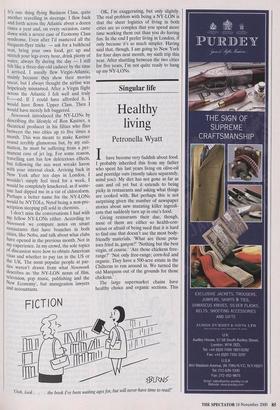Singular life
Healthy living
Petronella Wyatt
Ihave become very faddish about food. I probably inherited this from my father who spent his last years living on olive-oil and porridge oats (mostly taken separately, mind you). My diet has not gone as far as oats and oil yet but it extends to being picky in restaurants and asking what things are cooked with. But perhaps this is not surprising given the number of newspaper stories about new mutating killer ingredi- ents that suddenly turn up in one's food.
Giving restaurants their due, though, most of them are either so health-con- scious or afraid of being sued that it is hard to find one that doesn't use the most body- friendly materials. 'What are those pota- toes fried in, gargon?"Nothing but the best virgin, of course.' Are those chickens free- range?' Not only free-range; corn-fed and organic. They have a 500-acre estate in the Chilterns to run around in. We turned the old Marquess out of the grounds for those chickens.'
The large supermarket chains have healthy choice and organic sections. This Gunk . the book I've been waiting ages for, but will never have time to read!' commendable concern has spread to schools as well. In place of the old packet Smash and spotted dick, my young nieces are tempted with vegetarian options, and low-cholesterol salads. I don't think there are milk breaks any more — milk gives children indigestion and flatulence — but juice breaks. Cranberry and lemon mixers like in a New York smoothie bar.
Even the old workmen's cafés are chang- ing. My local black-cab shelter long ago replaced the baked beans and chips with consommé and poached eggs. They even do a take-away service that is available to the general public. Not bad at all at a few quid. So all the big institutions have made an effort to provide healthier food.
All that is except the one where it really matters. Hospitals. After my father died of cancer I talked to doctors who pointed out that cancer cells feed on sugar. If someone has cancer the last thing they should eat is anything sweet. Yet while he was in hospi- tal they plied him with sticky buns and sweets. 'For your strength,' they said.
I thought perhaps things had changed but then I went to an expensive private hospital last week to visit a close relative who was having an operation. They had grandly called the hospital menu 'room ser- vice' menu. It was full of things you thought you weren't supposed to eat, like macaroni cheese and meringue and ice- cream. I ordered a boiled egg. When it arrived it was as hard as a golf ball. I sent it back, pointing out I had asked for a soft- boiled egg.
`Oh, we can't give you a soft yolk,' they said. 'Why on earth not?' The astonishing reply came, 'Because of government guide- lines. A soft yolk could be bad for your health and kill you.' They went on to say that if I insisted on having any egg lightly cooked I had to sign a special disclaimer which would then have to go through the system. Perhaps I might be able to have a soft-boiled egg by the same time next week.
You mean to say, I went on, somewhat flabbergasted, that you offer patients ice- cream from a carton, with all sorts of addi- tives and saturated fats and you won't give them a boiled egg. They agreed that this was a bit of an anomaly. Why was hospital food so unhealthy? I asked. Were they try- ing to murder their patients? What was the point of performing a triple heart bypass on a middle-aged man and then giving him a bun that would help to bring on another one? It should be against the law.
One of the staff nurses agreed. When a colleague called her to dinner in the staff canteen I asked her what she would be offered there? She said she always brought her own food. The hospital food was too vile to eat. But why wasn't it healthier, I persisted. She assumed it was because unhealthy, artificial food was cheaper. So the government made sure schools had extra money for decent food for their pupils but it was acceptable to poison the sick and the elderly. Nice, that. Compas- sionate and caring.
But this wasn't even a NHS hospital. It was a private one that cost patients an arm and a leg — sometimes literally. It has Arabs coming in and out so that the corri- dors resemble the routes of old silk cara- vans. Surely for the £400 or so a night the patient pays they could give the poor sod an organic tomato.
Remember, dear, Greg and Tom are married to each other, Marcia's new boyfriend is a devout Muslim, and Carol's daughter has a serious weight problem. Keep all that in mind every time you're about to open your mouth and we should have a lovely evening.'



































































































 Previous page
Previous page